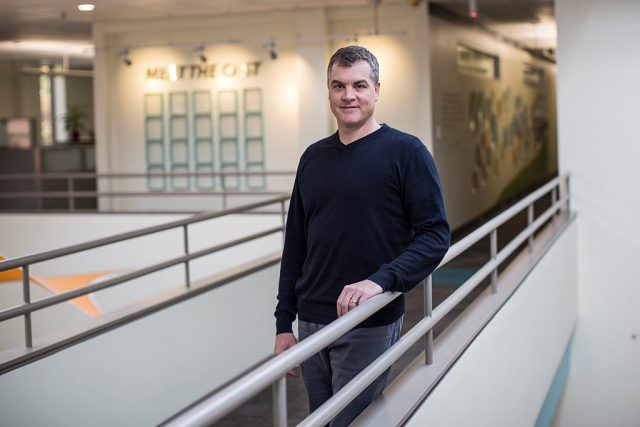A Conscious Approach to Teaching and Learning: Curriculum Associates
Rob Waldron’s phone was ringing off the hook, and it wasn’t because his company had just made one of the 10 largest charitable donations of 2016 by gifting the majority of its shares—worth about $121 million—to the Iowa State University Foundation. “Rob?” his assistant said, peeking into the office. “Another call. It’s about that news show. Do you want to take it?”

Instead of an outpouring in response to this historic gift, people were calling to congratulate Waldron, CEO of K-12 educational publishing company Curriculum Associates, because of his recent appearance on a local news show in which he shared his voluntary decision to boost the company’s minimum wage to $15 per hour.
Now people were calling from as far away as Canada, the company’s social media pages were filled with congratulations, and Waldron received multiple notes from strangers urging him to run for office. He went to dinner with his wife, and their waitress stopped to hug him, overwhelmed by the generosity of the $15 wage. “I’ve never been involved in anything in my career that resonated that much with people,” Waldron says. The gift to Iowa State will help generations of students, but Waldron got only two calls about that. “People want companies to treat them with dignity,” he reflected, “and this was never clearer to me than that week when our gift of over $100 million was overshadowed by a raise that by comparison cost us very little.”
The $15 wage idea started with the hiring effort for tech talent. As a master of recruiting top employees, Waldron knew that in order to secure the best candidates, final salary negotiations often required a last-minute boost of a few thousand dollars. When a team member approached him about raising the wages of warehouse workers from $12 to $13 per hour and expressed concerns that this would amount to “a lot of money,” Rob knew without question the right thing to do. He raised the minimum wage to $15, reasoning, “I didn’t even blink about giving the tech guy an extra $5,000 per year. Why am I not already doing this?”
“It cost a little over $100,000, and we could afford it,” Waldron explains. The raise affected about twenty people, many of whom are on their feet all day packing and shipping educational materials in the company’s warehouse. Waldron has always had a commitment to treating employees with grace, and he knew that this move would go a long way in improving this team’s well-being and happiness. He had long ago embraced the principles of Conscious Capitalism, and he understood that making this investment now would pay outsize dividends down the road.
As a leader, Waldron is taking the long-term view—such a long-term view that he signed an employment contract with 20-year terms when he joined Curriculum Associates in 2008. But when company founder Frank Ferguson first set the agreement in front of him, “I thought the man was certifiably crazy,” Waldron says. In fact, he was so sure the whole idea was off the rails that he almost walked away from it.

But before I became too indignant, a good friend pointed out to me that this was my dream job, Waldron continues, reflecting on the positions he previously held in both the nonprofit and for-profit education worlds.
Soon thereafter, he signed on the dotted line and became the only Harvard Business School graduate to sign a two-decade-long employment contract, as far as he knew.
“It wasn’t until a few months in that I fully realized how much the long-term view is a key success factor,” Waldron explained. In recruiting, for example, he found that when he talked to future employees about the company’s investment in workers and their vision for the next decade, the authenticity of this message delivered by a CEO who wasn’t going anywhere soon was clear. This perspective allowed the company to walk the walk and support its entire chain of stakeholders in the process.
Curriculum Associates has been serving students and educators for nearly 50 years, founded by Frank Ferguson and a small group of passionate educators in a garage in 1969. Committed to benefitting their stakeholders long before the phrase “Conscious Capitalism” became popularized, the team spent decades building a conscious company focused on putting students first and creating value for the entire stakeholder chain. “We have always been driven by our mission to make classrooms better for students and teachers,” explains Charlotte Fixler, Director of Communications.
Soon after he was hired, Waldron made his mark as a Conscious Leader during the first major test of his tenure as CEO. In 2009, a state-led effort to develop the Common Core State Standards was launched, and educational publishers had to overhaul their content to meet the new requirements. Many companies met the short deadline by simply repackaging their current offerings with new covers and minimal changes to content.
Curriculum Associates recognized the need to develop all-new print materials to address the rigor of the new standards and best serve students. This sparked an all-hands-on-deck effort, as they worked late nights and weekends to develop materials from scratch to meet the new standards. As Waldron remembers, it felt like “the last 60 seconds of a basketball game, where every move is crucial.” At that time, a delayed or unsuccessful launch could have threatened the future of the company.
At the same time, Curriculum Associates was also expanding its digital offerings with the development of its i-Ready program, moving from a traditional K-12 print company to an educational technology company. The timing of these new standards and their move to digital paved the groundwork for the successful transition for their center of gravity.
These programs began having a transformative impact on learning, particularly in high-poverty urban schools. As Waldron describes, “Our work is like creating the medical devices and machines that doctors and nurses use to save lives.”
Educators took note of Curriculum Associates’ new, more rigorous print and digital products. Schools loved the flexibility of the programs to target individual student needs. Teachers and administrators loved the ease of access to actionable data within i-Ready, allowing them to easily track and support student progress while helping students stay motivated.
Like most other companies, Curriculum Associates faced challenges during the 2008 recession, but Waldron’s attitude was that “being conscious means sticking with people and sticking with the product, even in the down times.” Curriculum Associates continued to invest in their burgeoning tech offerings and in their team at a time when many in the industry were divesting. They squeezed through the downturn, and the long-term view once again paid off. The company quadrupled in size from 2012 to 2016, a fact Waldron attributes to this early focus on investing in the team and in the products, no matter what.
Today, Curriculum Associates serves over 6 million students and 300,000 educators with its programs and has multiple offices across the country. Bookings have grown from $30 million in 2008 to $190 million in 2016, while the company grew from around 100 employees to more than 700 in that same time frame.
As part of his continued commitment to developing a Conscious Culture, Waldron started to solicit and even publish evaluations about his leadership from his employees—even the ones that stung.
My wife saw me reading pages of feedback one night and asked me how I could stand to read all of that criticism, he recounted.
“I told her it was like having dinner with her mother,” he chuckled. “I’m quite comfortable being told all the things I should do differently.” Waldron takes the criticism in stride and, most importantly, he takes the opinions of his team seriously. When he heard employee feedback that his unique brand of humor was off-putting, he reined in the joking.
Instead, he relies on other ways to put a smile on his face. He was recently boarding a flight and saw a Miami Herald headline on his phone screen: “Miami-Dade school grades mark a milestone: no F schools.” The district’s schools went from 16 F-rated schools to zero, meaning all schools showed progress, even those with financial woes, gang issues, kids in crisis, and other challenges. While the article didn’t mention Curriculum Associates’ software, Waldron smiled to himself knowing it was in use and driving gains in the schools mentioned.
In fact, over 13 percent of K-8 children in the United States now use their software every week. That day, driving back from the airport, Waldron knew that Curriculum Associates had provided educators with the tools they needed to make the classroom experience better for the learners who needed it most.
The torch for maintaining this nearly 50-year-old company’s vision of a better classroom and a better business has passed to Waldron, and he in turn has been considering the legacy of the company for the next generation. With the gift of the majority of company shares came the responsibility for finding the perfect-fit partner to buy and hold the company, and he believes selling to a larger corporation is not an ideal solution. Waldron has final say on who buys the company’s shares, ensuring that the work will go on, and Curriculum Associates will always belong to someone dedicated to Conscious Capitalism.
Update: During the time between finalizing this article and its publishing, Curriculum



